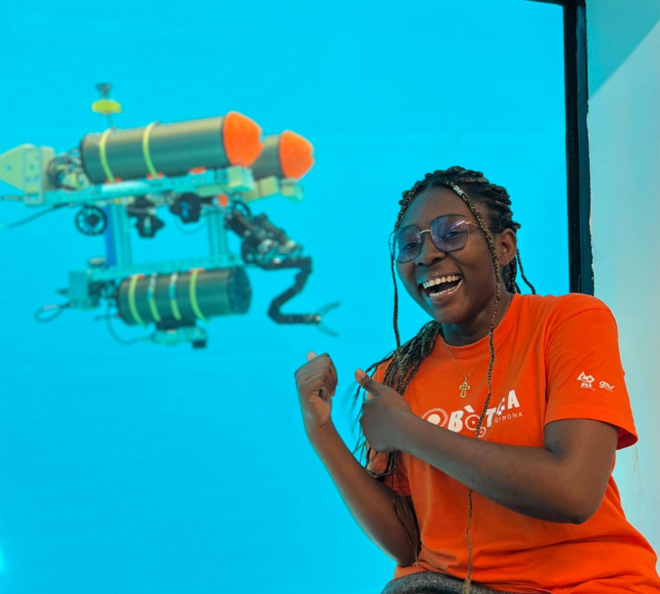Deborah Danjuma, an IFRoS student from the 2024-2026 promotion, recently took part in the RAMI 2025 International Underwater Robotics Competition as a key member of the “Mini-Girona” AUV team. Drawing on the skills from her IFRoS studies, Deborah was primarily responsible for the vehicle’s motion planning, programming the complex autonomous behaviors required for the competition tasks. Read about her impressive technical growth and her experience below.

“For the last four months, my teammates and I built the Mini-Girona, an intelligent Autonomous Underwater Vehicle, for our entry into the 2025 edition of the RAMI competition.
My job on the team, which included Taqi Hamoda, Thi Tran, Mazen Elgabalawy, Bilal Ahmed, Adel Saidani, Alaaeddine EL Masri El Chaarani, and Sebastian Realpe Rua, was primarily focused on the motion planning of the vehicle for the various task benchmarks of the competition. This included detecting and passing through a gate (orange buoys placed 2 metres apart), following a damaged pipe, and inspecting a damaged structure by fusing information from an MSIS sonar and Stereo camera setup. All of this had to be done autonomously.
The final three months of this project were challenging, with sleepless nights spent brainstorming and programming algorithms to solve the required tasks. Although I did not have the chance to go into the main competition area, I and the rest of the team who were also affected were able to work remotely with the team onsite—which was a challenge in itself.
Overall, this experience has been highly rewarding. I sharpened my critical thinking skills while brainstorming possible planning and control solutions and developed a wide range of technical abilities:
- I contributed to the Open Motion Planning Library for the Python community.
- I gained experience working with the BehaviorTree library with ROS integrated (a great resource, I must say!).
- I became proficient with the Docker engine and gained experience with ROS Noetic using both Python and C++.
- I became much more comfortable with the Linux terminal—I now prefer it to the GUI!
- Most importantly, I honed my ability to work effectively under pressure.
I’m grateful to have worked with the most amazing team of Professors, including Pere Ridao, Nuno Gracias, Narcis Palomeras, Patryk Cieślak, and Roger Pi Roig.
Thank you to the IFRoS Master for the opportunity to contribute to something this amazing, while learning a lot more than I ever imagined. Thank you to the NATO Centre for Maritime Research and Experimentation (CMRE) for the platform to work on this project, and thank you to Imma Güell for your support through the entire process. I can’t wait for what’s next to build!”

